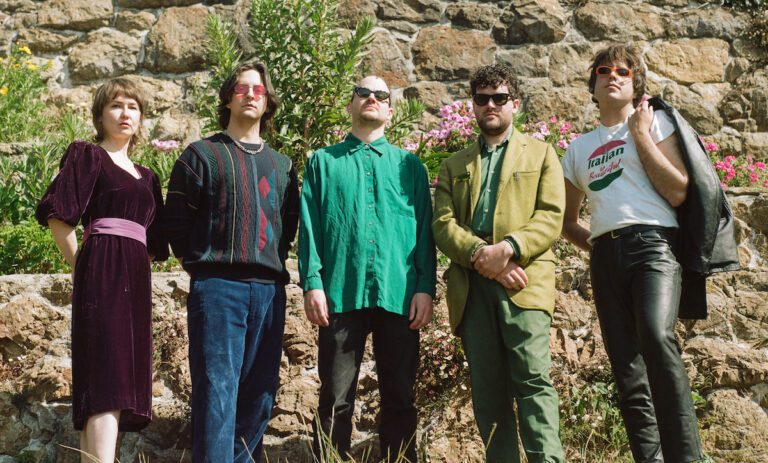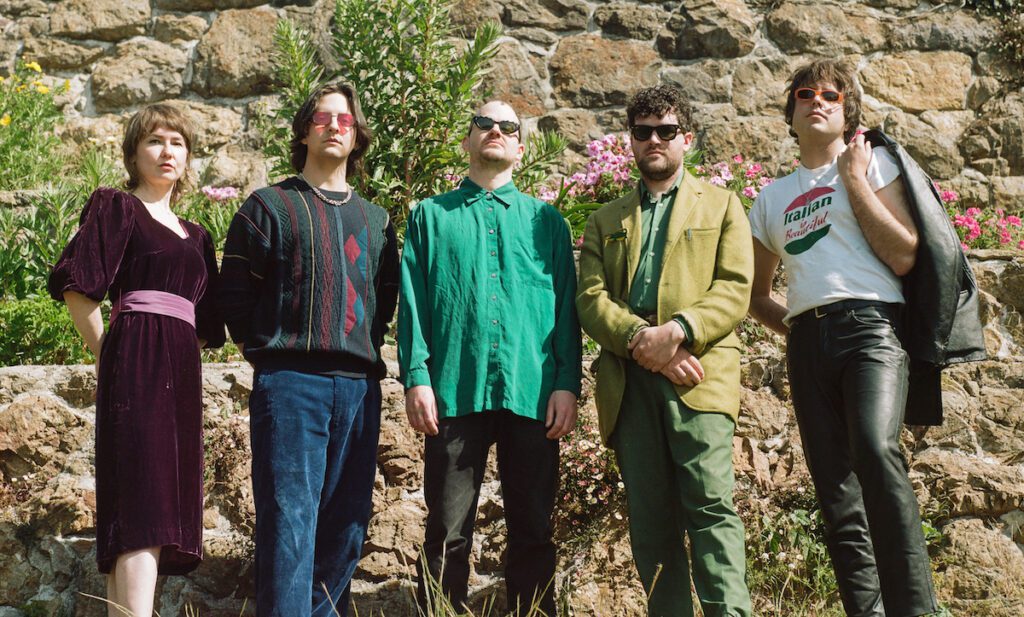Bay Area psych-pop collective Magic Fig weave a kaleidoscopic dreamscape of sound on their debut record, Valerian Tea — a lush blend of analog warmth, whimsical instrumentation, and existential wonder. The band’s intricate sonic layers and surreal lyricism invite listeners into a world where consciousness drifts between the cosmic and the deeply personal. From the Mellotron to the Moog Matriarch, every texture feels intentional — a brushstroke in a vivid auditory painting.
In this exclusive AudioFuzz interview, members Inna Showalter, Jon Chaney, Muzzy Moskowitz, Matt Ferrara, and Taylor Giffin open up about their inspirations, creative process, and how heartbreak, curiosity, and collaboration fueled the strange, beautiful sound of Valerian Tea.
1. “Flammarion” has this really dreamy, almost out-of-body feel to it. Since it’s inspired by Camille Flammarion and the idea of consciousness beyond the physical world, were you thinking more about cosmic themes or more personal, introspective ones when you wrote it?
Inna Showalter: A bit of both. I was working on this song during an introspective time where I was grappling with a lot of identity issues and heartbreak. Many things I used to think mattered to me lost their meaning and I felt like I was drifting along, observing everyone else going about their lives while I felt listless and depressed. I definitely indulged in some escapist tendencies during that time, some healthier than others. Being in my own little world singing a song to a long-dead astronomer whom I saw as a kindred spirit, oddly enough helped me make sense of what was going on.
2. There’s so much texture on the record — mellotron, glockenspiel, 12-string guitars — it feels like you’re painting with sound. How did you decide what layers belonged where, and was there one instrument that really shaped the vibe of Valerian Tea?
Jon Chaney: The Moog Matriarch of course.
Muzzy Moskowitz: The songs usually start with us playing them at practice, so they begin with just electric guitar, bass drums, and keys. When we record the songs we start layering every instrument available until it’s too much. Later we edit them and say “do we really need an organ and a synth and a piano and 3 guitars and 3 part vocal harmony?” Sometimes the answer is yes.
Matt Ferrara: I really wanted my bass to sound like a bassoon. I would argue that the meter of the song (3/4) really gives ‘Valerian Tea’ its woodland pastoral vibe more so than any instrument.
3. People have compared your sound to Broadcast — that balance of warmth and detachment, nostalgia and strangeness. Is that contrast something you consciously go for, or does it just kind of happen naturally in your songwriting?
Jon Chaney: I definitely love Broadcast but instrumentally I don’t think that influence was intentional. We do like to use a lot of the same types of chord progressions though.
Inna Showalter: I also love Broadcast and have immense respect for their work but I don’t believe our sound is that similar to theirs. Maybe the way I construct vocal melodies or my delivery could be seen as similar to Trish Keenan’s, which would certainly be a big compliment and an honor.
4. You’ve all played in other bands like The Umbrellas and Healing Potpourri. What was it like bringing those different backgrounds together for Magic Fig? Was there a moment in the studio where it suddenly felt like, “Okay, this is our sound”?
Taylor Giffin: Yes, we’ve all played in other bands, but I’m not sure how that had an effect on this project, so I guess bringing those different backgrounds together was seamless. I think our sound developed organically through all of us jamming together, and I think we’ve honed in on that sound over time.
Muzzy Moskowitz: The band is an opportunity for us to play music that would seem out of place or even tasteless in those other bands. In Magic Fig, there’s a “more is more” mentality that everyone has agreed to embrace.
Matt Ferrara: I’m not sure if this moment ever occurred. There are a lot of drivers and our sound changes a lot based on who shows up to the studio. Making records is like going to war.


